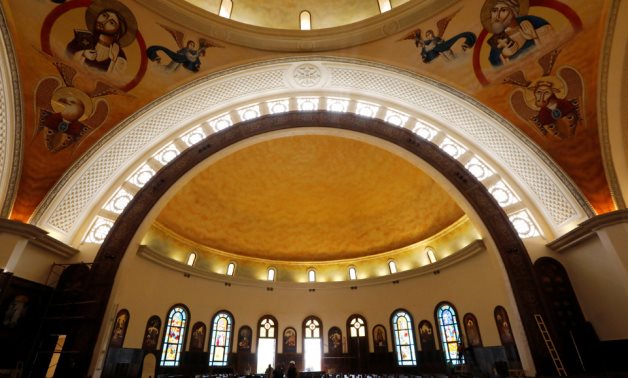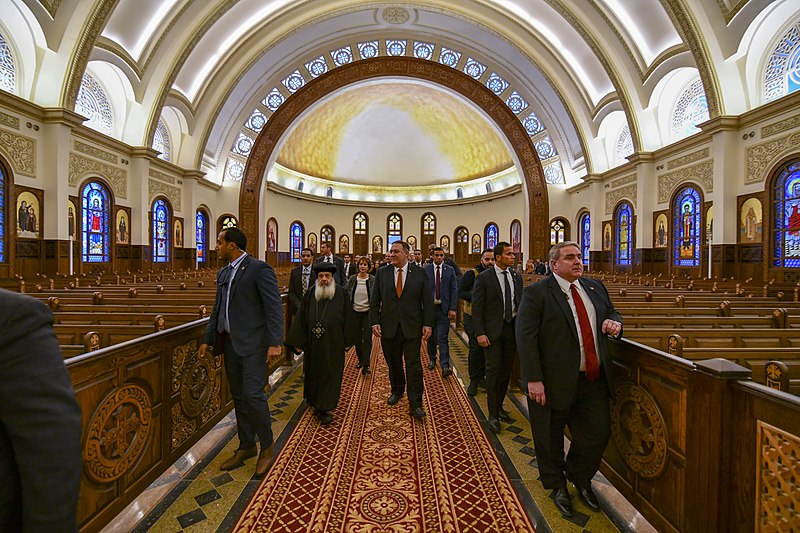
Workers clean the interior of the new Coptic Cathedral "The Nativity of Christ" before Sunday's Coptic Christmas Eve Mass in the New Administrative Capital (NAC) east of Cairo, Egypt January 3, 2019 - Reuters
CAIRO – 7 January 2021: The state is enjoying the best levels of social peace, harmony, solidarity and understanding between Egypt’s two religious components: Muslims and Christians, the Egyptian Cabinet said in a report, referring to the period since the June 30 Revolution in 2013.
This embodies a comprehensive model of national unity in light of the continuous efforts made by the political leadership to establish, enhance and dedicate the values of citizenship at the political, social and legislative levels.
Citizenship is considered one of the most important factors of the state’s stability and one of original constituents of the national security.
The citizenship values are based on supporting participation and equality among all citizens in terms of rights and duties, without any form of differentiation and discrimination.
These values are also based on accepting others, coexistence, constructive cooperation, as well as respecting and implementing laws that ensure the rights of the brotherly Christian people at various levels.
This has attracted local and international praise to the Egyptian state and political leadership.
The Cabinet’s report has shed light on the gains and pillars of the establishment of a state of national unity and citizenship in Egypt as well as the establishment of equality principles and the non-differentiation since the June 30 Revolution.
Presidential directives
The report also mentioned a series of events that affirm the political leadership’s keenness to lay the cornerstone of the values of citizenship and national unity within the state. It referred to a number of quotes by President Abdel Fattah El Sisi in this regard.
“There is not a discrimination between a religion and a religion. Everyone is equal. These are practices that should be carried out, implemented and translated into polices and mechanisms of operation within the state,” Sisi said earlier.
“We have issued a law to build churches in Egypt after it had been a dream for 150 years, because the state is concerned with securing the right of worship for all its citizens,” Sisi said.
“The state has to construct churches for its citizens, because they have the right in worship as everyone does and because it is the right of the citizen to worship as he pleases,” Sisi added.
The president also affirmed to the Armed Forces’ Engineering Authority and the government the necessity to build churches in the new cities. He also directed the Engineering Authority to quickly construct and restore church buildings assaulted in terrorist acts in 2013.
Also, the president also gave instructions to the Egyptian army to launch airstrikes against camps, hotbeds, training areas and ammunition and weapons stores belonging to ISIS terrorist group in Libya, in response to the crime committed against the “sons of the nation” on one of the Libyan coasts.
The report also shed light on the president’s participation in the Christmas celebrations with the Christian citizens. He is the first Egyptian president to attend a Christmas mass, as he has attended the mass every year since 2015.
The president laid the cornerstone of the Cathedral of the Nativity of Christ In the New Administrative Capital to become the largest in the Middle East, beside the Al-Fattah Al-Aleem mosque.
Egypt has enjoyed good relations with Vatican. Sisi visited the European country in November 2014 and affirmed during his visit his appreciation of Pope Francis’s stances towards Egypt. In April 2017, Pope Francis visited Egypt, the first visit of its kind to Egypt, with the aim of establishing the values of tolerance and dialogue among religions.
Constitutional developments
The report has displayed developments in the Egyptian constitutions across different periods so that they suit people’s aspiration towards citizenship and national unity.
- Article 40 of the 1971 Constitution stipulates that citizens are equal before the law and are equal in general rights and duties. They are not subject to discrimination because of gender, origin, language, religion or belief.
Also, article 46 of the 1971 Constitution stipulates that the state is tasked with securing the freedom of belief and of performing religious rituals.
- The 2012 Constitution has maintained both articles but deleted the sentence saying: “because of gender, origin, language, religion or belief” from article 40 and added “and establishing worship places for monotheistic religions.
Also, an article was added stipulating that the principles of the religious canons of Egyptian Christians and Jews are the source of the main legislations organizing their personal conditions and religious affairs. It also gives them the right to choose their spiritual leadership.
Another article was added stipulating that the political leadership is based on democracy, consultation and citizenship, which achieves equality among all citizens in general rights and duties.
- In the 2014 Constitution, an article was added stipulating that only people have the sovereignty and shall practice and protect it and are the source of authorities. They protect the national unity that is based on the principles of equality, justice and equal chances for all citizens.
Article 9 was also added stipulating that the state is committed to achieving equal chances for all citizens without discrimination.
Article 53 of the Constitution was also added to stipulate that citizens are equal before the law; they are equal in general rights, freedoms and duties, without any discrimination due to a religion or a belief.
Article 64 was added to stipulate that the freedom of belief is absolute and the freedom to perform religious rituals and to construct worship places for people of monotheistic religions is a right organized by the law.
Article 50 refers to the state’s duty to protect the Egyptian cultural and civilizational heritage, including that related to Islam and Christianity.
Article 180 stipulates that each municipal unit shall conduct secret direct vote to elect a council for four years, which shall include an appropriate representation of Christians.
Article 235 stipulated that the House of Representatives shall in its first session after this Constitution comes into effect issue a law that organized the construction and restoration of churches, in a way that secures the Christian people’s freedom to perform their religious rituals.
Article 244 stipulate that the state shall work on ensuring that youth and Christians are appropriately represented in the House of Representatives.
Licensing churches
Activating article 235, law no. 80 of 2016 was issued to organize the construction and restoration of churches.
The law stipulates the need to take quick steps to legalize the existing churches, and it is prohibited to change the purpose of a licensed church or a related building.
A committee was formed in January 2017, headed by the Prime Minister with the membership of six ministers and representatives of the concerned community and sovereign bodies.
This committee is in charge of receiving requests to license churches, studying them and verifying that the conditions set for this are met.
Since May 2018, 18 licensing decisions were issued by the committee until December 2020. Four decisions were issued in 2018 to license a total of 508 churches and related buildings.
In 2019, a total of 814 churches and related buildings have been licensed.
As for the decisions issued in 2020, the report indicated that 6 licensing decisions were issued for a total of 478 churches and related buildings.
Thus, the total number of churches and related buildings licensed by the committee has reached 1800 in the governorates of Cairo, Giza, Qalyubia, Alexandria, Minya, Souhag, Assiut, Sharqia, Beheira, Beni Suef, Gharbia, Aswan, Luxor, Red Sea, Daqahlia, Menoufia, Qena, Suez, Ismailia, Matrouh, Port Said, Fayoum, Kafr El-Sheikh, North Sinai, South Sinai and New Valley.
Since 2014, as several decisions were issued to allocate lands for building churches in new cities at the request of the three Christian sects.
A total of 40 churches were established and 34 others are being built in the new cities during the period from July 2014 until December 2020, the report said. Also, 75 churches have been restored and renovated after being destroyed by terrorist-related violence in 2013.
Political representation
The representation of Christians in the Parliament and high-level positions has witnessed an unprecedented increase, as the number of Christian parliamentarians in 2021 reached 3, compared to 5 in 2012.
The report also showed that for the first time in the history of the Senate, the number of seats taken by Christian parliamentarians reached 24 in 2020, compared to 15 in 2012.
Citizenship index
The report indicated that, thanks to efforts to enhance citizenship values, Egypt has witnessed an improvement in societal stability indicators, to come in 65th place in 2020 of the citizenship ranking of US News, up from 69th in 2019, 75th in 2018, and 77th in 2017.
Egypt also advanced 14 places in the Social Security and Safety Index in the Global Peace Index issued by the Institute for Economics and Peace, where it ranked 100 in 2020, compared to 114 in 2014.
The report also referred to Sisi’s formation of a high committee to face sectarian conflicts and cancellation of texts inciting violence and extremism in the educational curricula.
It also referred to the Document on Human Fraternity for World Peace and Living Together signed by Egypt’s Al-Azhar Grand Sheikh Ahmed El-Tayyeb and Pope Francis.
The report displayed societal stability evidence in Egypt, according to a report by the US Commission on International Religious Freedom. The US report mentioned that violence in Egypt among local communities has decreased by 29 percent between 2018 and 2019.
It also mentioned that Egypt has been excluded from the list of countries of concern for the fourth year in a row, in accordance with the International Religious Freedom Act.
International praise
Pope Francis praised efforts made by Sisi to achieve co-existence among all religions in Egypt, which was reflected by the inauguration of the massive church and mosque in the new capital.
French President Emmanuel Macron expressed his appreciation to the Egyptian state to recognize all religions and ensure the freedom of worship and belief.
US President Donald Trump expressed happiness for the inauguration of the Middle East’s biggest cathedral in the Middle East, hailing Sisi for such move.
“Excited to see our friends in Egypt opening the biggest Cathedral in the Middle East. President El-Sisi is moving his country to a more inclusive future!”

German Chancellor Angela Merkel said Christian people in Egypt are living very good conditions in terms of performing their religious rituals. She added that they enjoy governmental support.
Greek Prime Minister Kyriakos Mitsotakis affirmed that Egypt is carrying out an important and pivotal role in enhancing peaceful coexistence and communication among people of different religions and cultures, which have existed in Egypt for many centuries.
President of the European Council Charles Michel highlighted the European Union’s trust in the Egyptian pivotal role, which is known for balance and wisdom, to face extremist thought, acts of violence and intolerance locally and on the regional level.
Michel added that Egypt has become a role model for activating peaceful coexistence initiatives and initiatives to achieve peace and constructive cooperation among peoples.
Comments
Leave a Comment